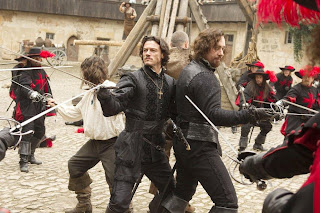Tuesday, October 25, 2011
About the Classics
This weekend saw the release of the movie The Three Musketeers -- the latest offering in over twenty film adaptations of the classic Dumas tale. Since the early days of motion pictures, Dumas's classic stories of the adventures of Athos, Porthos, Aramis, and D'Artagnan have graced the silver screen in a variety of interpretations and incarnations.
The interpretations are as varied as the filmmakers behind them. There's the silent Douglas Fairbanks version, the classic two-parter with Oliver Reed and Raquel Welch, the fluffy but fun modernized Disney take. (This newest version does appear to be the first adaptation in 3-D. To be fair.)
Dumas joins a cadre of fellow authors -- like Charles Dickens, Agatha Christie, Arthur Conan Doyle, and William Shakespeare -- whose classic works are often adapted for the big (and small) screen. But for every version of A Christmas Carol or Sherlock Holmes that appears -- as adaptations become farther and farther removed from their source material -- it's interesting to go back and look at the original stories ... and their authors.
Read on for a handful of little-known facts about the authors behind some of the biggest-known stories in history (with a particular look at Mr. Dumas himself):
-- Alexandre Dumas suffered from insomnia.
-- It's important to have a hobby: Charles Dickens was interested in hypnotism and conjuring. Lewis Carroll was an amateur photographer; Jane Austen did embroidery.
-- Number of books Dumas wrote in his lifetime: 272.
-- Master of Mystery Agatha Christie went missing for several days in December 1926, shortly after discovering her husband was having an affair. She was found at a health resort in Yorkshire ten days later. (There have been rumors of suicide attempts and amnesia, although the time-travelling science fiction show Doctor Who has the most unique explanation for her disappearance.)
-- Meanwhile, the Master of the Macabre -- Edgar Allan Poe -- is reported to have never started to write until he had completely mapped out his story, setting, and characters. He is also said to have paced back and forth across the room to get revved up before beginning to work.
-- Dumas wasn't just an author; during the 1830 French revolution, he operated as a secret agent, helping to place the Duc d'Orleans on the French throne.
-- It is rumored that Victor Hugo considered calling The Hunchback of Notre Dame "What there is in a bottle of ink" because he penned the last line of the novel with the last drop of ink in the bottle.
-- Dickens doubled as an actor. He is said to have gotten so excited performing his own work onstage that he'd sometimes pass out from overexcitement.
-- There are actually two authors by the name of Alexandre Dumas: Alexandre Dumas pere (father) and Alexandre Dumas fils (son). (The father was the one of Musketeer and Monte Cristo fame.)
-- Hugo wrote his first play when he was only 14.
-- Dumas was once asked to donate 25 francs towards the funeral expenses of a recently deceased bailiff. Not a fan of the office, Dumas apparently tossed over 50 francs and snapped, "There you are -- bury two of them!"
-- H.G. Wells always carried two pens with him, one large and one small. He claimed the big one was for the long words and the little one was for the small ones.
-- William Shakespeare had eleven different ways of spelling his name.
-- Dumas's supposed last words, referring to his unfinished book: "I shall never know how it all comes out now."
-- Post by Ms. B
Subscribe to:
Post Comments (Atom)



No comments:
Post a Comment